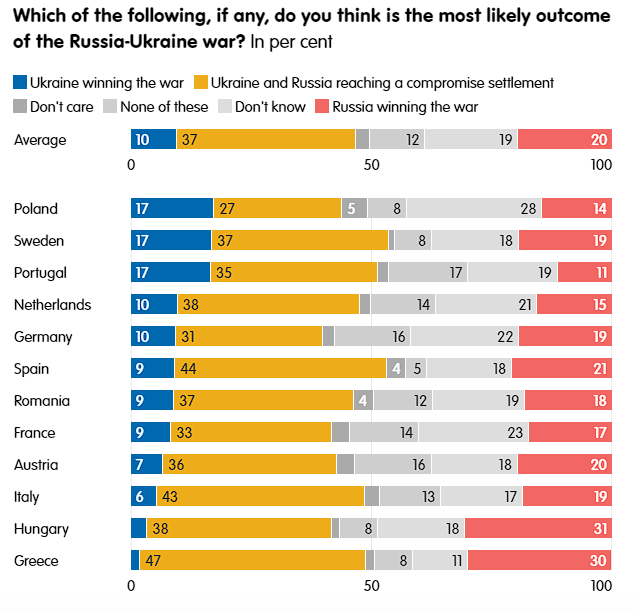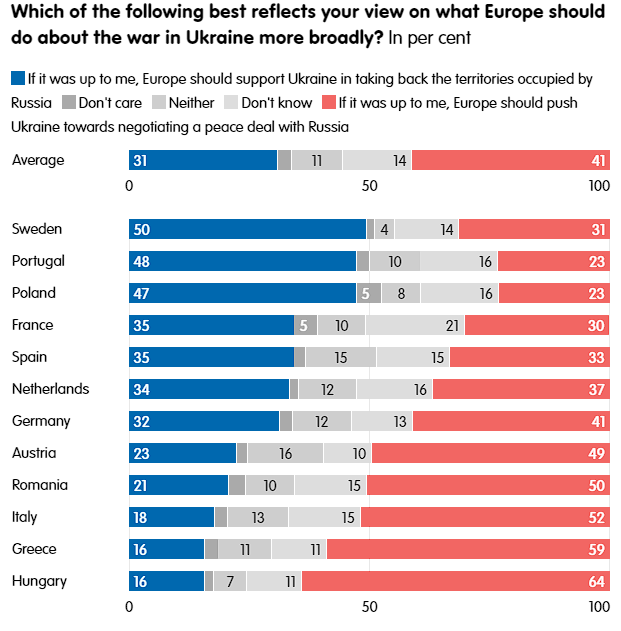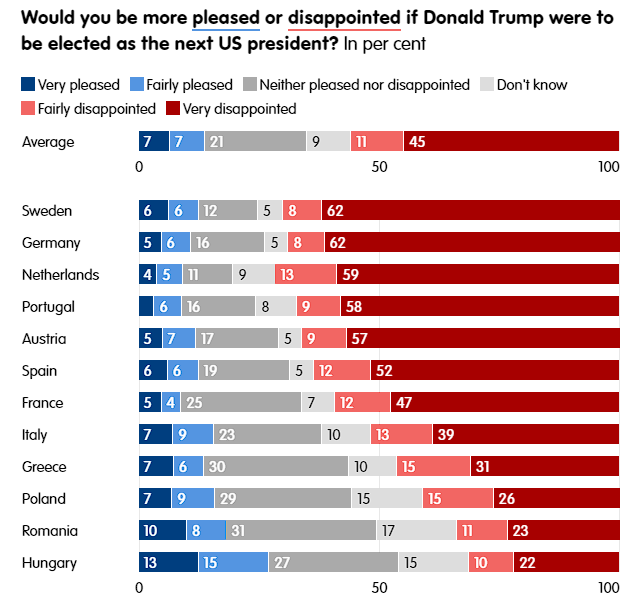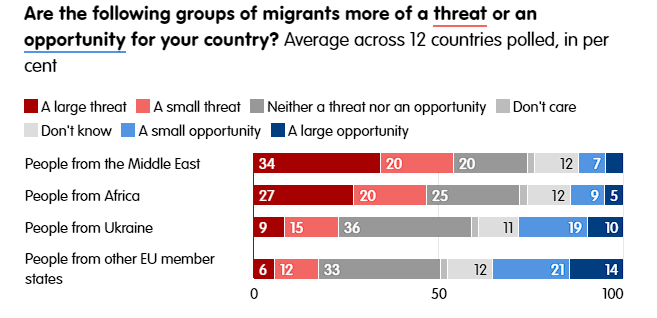
According to a report released this week by the European Council on Foreign Relations (ECFR), a multinational study indicates growing pessimism across Europe regarding the conflict between Russia and Ukraine. The report, issued ahead of the second anniversary of Russia’s invasion of Ukraine, reveals that, on average, only 10% of Europeans believe Ukraine will emerge victorious in the conflict. The prevailing sentiment among all 12 participating member states is that a “compromise agreement” will be the resolution to end the war.

In three nations (Sweden, Portugal, and Poland), there’s a preference for supporting Ukraine’s efforts to regain its territory (at 50%, 48%, and 47%, respectively). In five other countries – including neighboring Hungary (at 64%), Greece (59%), Italy (52%), Romania (50%), and Austria (49%) – there’s a clear inclination to pressure Kyiv into accepting a settlement, as per the study. Elsewhere, public opinion is split, with France (35% for continued fighting versus 30% for negotiating an agreement), Germany (32% versus 41%), the Netherlands (34% versus 37%), and Spain (35% versus 33%) showing divergent views.

Regarding the European perspective on the military outcome, twice the number of respondents (20%) anticipate a victory for Russia in the conflict. The waning confidence in the Ukrainian war effort is evident throughout Europe, with even the most optimistic surveyed member states (Poland, Sweden, and Portugal) having less than one in five respondents (17%) believing in Kyiv’s potential to prevail. As per the study’s authors, Ivan Krastev and Mark Leonard, this change in sentiment is attributed to the Ukrainian army’s slowed counteroffensive, escalating concerns about the current shift in US policy, and the implications of Donald Trump’s potential reelection on the war effort. Mr. Trump made no secret of the fact that he is far less enthusiastic (in comparison to incumbent Joe Biden) to finance other offensive efforts of the Ukrainian army.
The authors of the study believe that to maintain persuasive arguments in support of Ukraine, EU leaders will have to adjust their rhetoric to avoid seeming unrealistic to a skeptical audience. It is also crucial for Kiev to cause a fracture in the Russian army’s momentum, having in mind that the last few months, the news cycle has mostly been filled with victories of Putin’s army (with the latest at Avdiivka). A highly noteworthy finding from the study is that many perceive the conflict in Ukraine as being existential for Europe. When respondents were questioned about which conflict had the most significant impact on their “country” and on “Europe” (between the Gaza conflict involving Israel and Hamas, and the conflict in Ukraine), 33% opted for Ukraine. In contrast, only 5% chose the Gaza conflict. This indicates that Europeans are increasingly acknowledging the regional importance of this war and feel accountable for its resolution.
On average, 41% of Europeans feel that the EU should either “boost” or “keep steady” its current level of assistance to Ukraine if Trump withdraws American aid. Although only a minority of Europeans (20%) would escalate support for Ukraine to offset a potential US withdrawal, 21% expressed a preference to maintain the support level unchanged. A third of respondents (33%) would prefer the EU to mirror the US in curtailing assistance.
Perceptions on a 2nd Trump Term in Europe
One of the major findings of ECFR’s work is that the majority of Europeans do not have pleasant feelings about a return to power of Donald Trump, especially after the dubious comments made on the issue of NATO. Mr. Trump is not an element of stability for the defensive alliance that the European Union heavily relies on, and this can be seen in the most recent polling done by the creators of the study. In total, 45% of respondents would be highly disappointed and 11% fairly disappointed. Even in Italy, only 16% of citizens would want to see the former president take office once again, compared to 37,5% of the population who voted for Fratelli d’Italia. The only European state where opinions strongly collide would be Hungary, with 28% in favor of a Trump return and 32% against it.

This perception could also be linked to an awareness of the limits of US power in today’s world and of the dysfunctional nature of American domestic politics. (On average, according to our poll, 48 per cent of people across Europe view the United States’ political system as broken, including large pluralities in all 12 countries polled except for Hungary, Poland, and Romania.) – Ivan Krastev & Mark Leonard
Perceptions on War-Related Migration
One of the most intriguing discoveries in the survey revolves around public sentiments towards Ukrainian migrants. Participants were questioned in all 12 countries about their perceptions of migrants from various regions of the world, whether they viewed them as an opportunity or a threat. In numerous countries surveyed, there existed a notable apprehension towards immigration, predominantly directed towards migrants from the Middle East or Africa. However, Ukrainians were generally regarded positively or, at the very least, neutrally, akin to individuals from other EU member states. On average, 28 percent of respondents regarded migrants from Ukraine as an opportunity, 23 percent considered them a threat, while 36 percent deemed them neither of these.

The artisans of the study refuse to elaborate extensively on this issue, displaying a somewhat surprised attitude to these findings. However, such results can be viewed as predictable, due to multiple facts, mainly:
1) Refugees from Ukraine have a higher degree of cultural compatibility with the residents of EU member states, some of them being well versed in languages spoken in the Union, and coming from a Christian background
2) Migrants from the Middle East and Africa have a long history of being related to incidents of violence, abuse and enclavisation, as I have explained here. Meanwhile, the migration flux from Ukraine did not seem to statistically increase crime rates or provoke major incidents.
A somewhat paradoxical situation arises from the fact that the highest percentages of individuals viewed Ukrainian migrants as a threat in Poland (40 percent), Hungary (37 percent), and Romania (35 percent). While this could be partially attributed to the relatively substantial influx of Ukrainians that Poland has accommodated since February 2022, it still poses a significant challenge.
Personal Conclusions
After two years of war (and the financial and humanitarian issues that arise with it), fatigue is clearly visible in the European camp. It is old knowledge that prolonged warfare favors whoever holds the momentum on the battlefield, and at this time, the holder of said momentum is the Russian Federation. The pessimism of Europeans that Ukraine will not be able to achieve its starting goals: the liberation of all territory occupied ever since 2014, “all the way to Crimea“, is justified by realities on the front line and by the change in US policy.
However, now is the moment when it is more important than ever to support the cause of Ukraine and what could be defined as “a just peace” – a settlement that looks to prevent further occupation of its territory but also recognizes the battlefield realities. After the initial offensive of the Ukrainian armed forces that took back Kharkhiv and Kherson, Henry Kissinger declared that the moment was ripe for negotiations. His comments were heavily slammed back then even by the authorities in Kiev, who deemed it as an appeasement to the aggressor and a lack of faith that they can regain all that was lost. But the truth is, as time goes by and aid lessens, the only side who seems to be gaining an advantage is Russia.
The goal of Ukraine’s supporters right now should be to minimalize the territorial losses that Ukraine will suffer and the imposing of terms that guarantee further conflict is avoided.
Methodology of cited study included in original source



 Subscribe
Subscribe